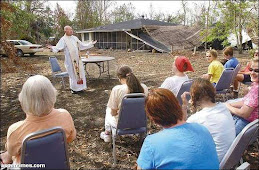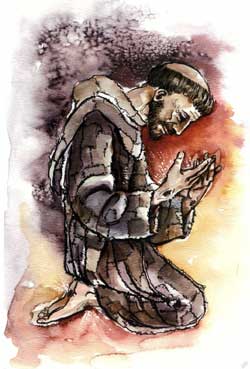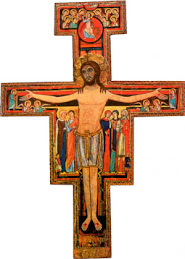By Ouida Tomlinson, SFO
Saint Francis created a new form of life, different from and more difficult than the monastic and canonical forms in favor during the early 1200’s. He was deeply convinced that the Lord Jesus Christ was guiding him.
Followers soon joined him in his new life, and they formed a fraternity based on the gospel, following in the footsteps of Our Lord Jesus Christ. They were both active and contemplative, preachers, living by the work of their hands, caring for the sick and the poor and begging when necessary. They spent time in daily prayer, together and in solitude. They prayed the Liturgy of the Hours and other prayers. Francis wrote their form of life “in a few simple words,” which the Lord inspired him to write.
The Lord inspired in Francis the desire to live as Jesus and his disciples had lived, to follow a life more closely resembling the life of Jesus during his early mission, shared with Mary and his disciples. Jesus was poor, a transient, living on alms, he, his mother and his disciples. The Lord inspired Francis to live the gospel life. This is in contrast to the religious communities of his day which sought to imitate the early Christian community in Jerusalem described in the book of Acts.
Saint Clare developed the “new form of life” in a women’s community, combining the elements of monastic life with the life of lay women penitents and characterized by sisterly communion, prayer and manual labor. There was no requirement for a dowry for entrance. The women relied on the work of their hands, and when that was not enough, they relied on begging, especially that done by the brothers. Clare’s Rule was the first of its kind, written by a woman for women.
Other groups, during the times before and around the time of Francis, had pointed to the Gospel as their rule also, but unlike these groups, Francis stayed in close communion with the Papacy, respecting the Pope and clergy.
The spirituality of Saint Francis and the Franciscan tradition is Christ-centered. Christocentric. There are several themes of this spirituality. Among them are poverty or living without grasping; being contemplative in places of solitude (Francis’ rule for the brothers living in hermitages); the suffering of Christ and the cross (suffering, death and glorification); the cross as the depths of charity; Francis in his physical mirroring of Christ’s suffering and Clare’s mystical identification with Christ, described in her writings; creation, nature, the world as a revelation of God; Canticle of the Creatures; and Francis’ unique relationship with animals, plants, and natural elements. Francis combined austerity of life with an infectious joy.
The incarnation is very important in Franciscan spirituality. From this Francis discovers that God is good, humble and generous. He does not hold onto anything, even divine status. All creation proceeds from the Son and this Son comes to us as a creature. Francis discovers what it means to be made in the image of God as he looks at Jesus. Thus he learns what it means to be himself, to know God, and the other (brothers and sisters which include human beings and all creation).
The story of Christmas at Greccio, with the simplicity, humility and poverty that are present, portray the marks of the life of Jesus. The Feast of Christmas, the Eucharist and the example of Mary pointed Francis toward the poverty and humility of God revealed in Jesus. This Jesus who born in a shelter for the animals, this Jesus who lived as a poor man and died for us on a cross, this Jesus who humbles himself to descend from his throne in heaven to become bread and wine for us, this poor Jesus is the way, the truth and the life. For Francis, poverty begins with the example of God as seen in Jesus.
"Have among yourselves the same attitude that is also yours in Christ Jesus Who, though he was in the form of God, did not regard equality with God something to be grasped. Rather, he emptied himself, taking the form of a slave, coming in human likeness; and found human in appearance, he humbled himself, becoming obedient to death, even death on a cross. Because of this, God greatly exalted him and bestowed on him the name that is above every name, that at the name of Jesus every knee should bend, of those in heaven and on earth and under the earth, and every tongue confess that Jesus Christ is Lord, to the glory of God the Father." Philippians 2:5-11.
"For you know the gracious act of our Lord Jesus Christ, that for your sake he became poor although he was rich, so that by his poverty you might become rich. 2 Corinthians 8:9.
The poverty of Francis was a response to Jesus who did not “grasp” or cling to divine status. He let go of it to be among us as a servant. Poverty must have this Christological understanding or else it becomes simply a penitential practice, a means of ascetical discipline or moral self-improvement whereby it is only a matter of having fewer of this or that, making a caricature out of the vision of Francis.
SUGGESTED READING AND INSPIRATION FOR MOST OF THIS WRITING
Poverty and Joy: The Franciscan Tradition by William J. Short, OFM, ISBN-10: 1570752958, ISBN-13: 978-1570752957.


















1 comment:
Sounds good to me!
Post a Comment